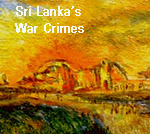"To us all towns are one, all men our kin. |
"To us all towns are one, all men our kin. |
| Home | Trans State Nation | Tamil Eelam | Beyond Tamil Nation | Comments |
Sri Lanka's Genocidal War - '95 to '01
Sri Lanka bombs Tamil villages under cover of Press censorship
 On Friday, 5 June 1998, Sri Lanka imposed a blanket media censorship on 'any material containing any matter which pertains to any operations carried out.. by the Armed Forces or the Police Force (including the Special Task Force)'. The ban covered publication both within and outside Sri Lanka and for the first time, appointed a military officer as the Competent Authority to implement the censorship. On Wednesday 10 June 1998, the Vienna-based International Press Institute (IPI) condemned the government of Sri Lanka for imposing the ban and said that the ban was a "flagrant breach" of pledges by the government of President Chandrika Kumaratunga on press freedom.
On Friday, 5 June 1998, Sri Lanka imposed a blanket media censorship on 'any material containing any matter which pertains to any operations carried out.. by the Armed Forces or the Police Force (including the Special Task Force)'. The ban covered publication both within and outside Sri Lanka and for the first time, appointed a military officer as the Competent Authority to implement the censorship. On Wednesday 10 June 1998, the Vienna-based International Press Institute (IPI) condemned the government of Sri Lanka for imposing the ban and said that the ban was a "flagrant breach" of pledges by the government of President Chandrika Kumaratunga on press freedom.
"IPI is concerned that the imposition of censorship on military news will make only the official, state version of the war available to Sri Lankans," it said in an open letter to the Sri Lankan head of state. "We regard this censorship as a flagrant breach of the government's election pledge to uphold press freedom in Sri Lanka," it added.
The reporting ban, imposed last Friday and including domestic and foreign correspondents, has provoked angry reactions in Sri Lanka including blank columns in weekend papers. (Vienna, 10 June AFP Report)
On 9 June, under cover of the press censorship, Sri Lanka launched a calculated bombing raid on Tamil villages in the Mullaitivu District. The Liberation Tigers of Tamil Eelam (LTTE) said in a statement sent from their London office on 10 June 1998, that two Kfir jets of the Sri Lankan airforce carried out "a massive bombing raid" in the district of Mullaitivu killing at least 20 and wounding 50 others. It said the military later used artillery to pound the area. "Many more were killed and injured in this massive shell fire... As most of the civilian dwellings are ruined the survivors are leaving the area carrying their belongings. Fearing to stay in the vicinity most of the inhabitants of the adjoining settlements have fled to distant parts" the LTTE said.
The attack launched by Sri Lanka follows an earlier pattern. On 22 September 1996, the Sri Lanka airforce bombed the Nagar Kovil school within hours of Sri Lanka imposing a Press Censorship. The British Refugee Council, Sri Lanka Monitor commented on that occasion:
"Hours after the Sri Lanka government imposed military censorship on press reporting ... on 21 September, aircraft bombed a Jaffna school yard crammed with 750 children on their lunch break, killing 34 and seriously injuring over 150 others"
Sri Lanka reimposed Press Censorship on 5 June 1998 despite the declared view of Article 19 in March 1996 that the earlier censorship had gone 'far beyond any legitimate interest in protecting national security or public order'.